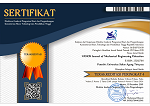STEM BASED EDUCATION FOR FUTURE LEARNING: CASE STUDY IN SMK UNGGULAN TERPADU PGII BANDUNG
Abstract
This research aims to investigate of implementation STEM education in SMK Unggulan Terpadu PGII Bandung. The research used the qualitative case study approach. This research took place at SMK Unggulan Terpadu PGII Bandung. The informants in this research were the Vice Principal of the curriculum field in SMK Unggulan PGII and Lecture of Informatics Engineering. The data were collected through observations, in-depth interviews, and documentation. The technical analysis of the data referred to the analysis of Miles & Huberman interactive model, including data collection, data condensation, data display, and drawing and verifying conclusions. The result shows that STEM Education leads students to be able to solve problems, innovative, logical thinking, and insightful technology. So STEM will be implemented through: (1) Scientific-based learning; and (2) Achievement of Learning through Sustainable Learning.
Keywords
Full Text:
PDFReferences
Abdulmajid, N. W. (2015). Pola Pembimbingan di Tempat Kerja: Studi Kasus Pelaksanaan Program Praktik Industri di PT JMI. Taman Vokasi, 3(2).
Abdulmajid, N. W. (2016). Kontribusi Program Praktik Industri dalam Peningkatan Kompetensi Siswa SMK. Jurnal MEKOM (Media Komunikasi Pendidikan Kejuruan), 3(1).
Abdulmajid, N. W., & Setiadi, B. R. (2015). Pemanfaatan Social Web Environment dalam Menciptakan Student-Centered Learning Dan Peningkatan Keterampilan Siswa Pada Pembelajaran. In Seminar Nasional Universitas PGRI Yogyakarta.
Emzir. (2010). Metodologi penelitian kualitatif: Analisis data. Jakarta: Rajawali Pers.
Harwell et al. (2015). A Study of STEM Assessments in Engineering, Science, and Mathematics for Elementary and Middle School Students. School Science and Mathematic. Vol 115 (2)
Majid, N.W.A. (2013). Pengaruh Pengalaman Praktik Kerja Industri dan Kompetensi TIK Terhadap Kesiapan Kerja Kelas XII SMKN 3 Yogyakarta Tahun Ajaran 2012/2013. Jurnal Pendidikan dan Teknologi Kejuruan, 2(3), 18-20.
Majid, N.W.A. (2015). Proses Perolehan Kompetensi Teknologi Informasi dan Komunikasi (TIK) dalam Program Praktik Industri Pada Industri Pasangan SMKN 2 Pengasih Kulon Progo. Tesis. Universitas Negeri Yogyakarta, Yogyakarta.
Majid, N. W. A., & Sudira, P. (2017). Proses perolehan kompetensi TIK melalui program praktik industri siswa SMKN 2 Pengasih Kulon Progo. Jurnal Pendidikan Vokasi, 7(1), 14–29.
Miles, M.B., Huberman, A.M., & Saldaña, J. (2014). Qualitative data analysis: A methods sourcebook (3rd edition). New York: SAGE Publications, Inc.
Milner, Diana I, et al. (2014). Development and Evaluation of STEM Interest and Self-Efficacy Tests. Journal of Career Assessment. Vol. 22(4) 642-653
Milner, Diana I, et al. (2014). Development and Evaluation of STEM Interest and Self-Efficacy Tests. Journal of Career Assessment. Vol. 22(4) 642-653
National Education Association. (2012). Preparing 21st century students for a global society
National Research Council. (2011). Successful K-12 STEM Education: Identifying Effective Approaches in Science, Technology, Engineering, and Mathematics. Committee on Highly Successful Science Programs for K-12 Science Education. Board on Science Education and Board on Testing and Assessment, Division of Behavioral and Social Sciences and Education. Washington, DC: The National Academies Press.
OECD. (2013). PISA 2012 Assessment and Analytical Framework Mathematics, Reading, Science, Problem Solving, And Financial Literacy. OECD Publishing
Presiden. (2005). Peraturan Pemerintah RI Nomor 19, Tahun 2005, Tentang Standar Nasional Pendidikan
Rochmah, E., & Majid, N.W.A. (2017). Manajemen Pembelajaran Interaktif Berbasis Moodle. Cirebon: Nurjati Press.
Rustaman. N. (2016). Pembelajaran Sains Masa Depan Berbasis STEM Education. Prosiding Seminar Nasional Biologi Edukasi 1 2016. Program Studi Pendidikan Biologi STKIP PGRI Sumatera Barat
Yovanda, Y.R. (2016). Persaingan MEA Sengit, Indonesia Bisa Keok jika Tidak Siap. Diambil dari https://ekbis.sindonews.com/read/1142823/34/persaingan-mea-sengit-indonesia-bisa-keok-jika-tidak-siap-1475027811
DOI: http://dx.doi.org/10.30870/vanos.v3i1.3371
Refbacks
- There are currently no refbacks.

This work is licensed under a Creative Commons Attribution 4.0 International License.


.png)
.png)
